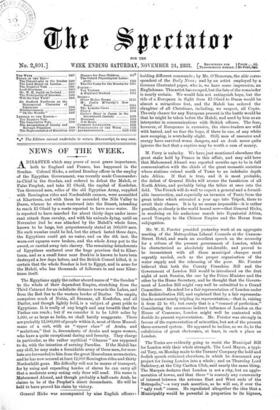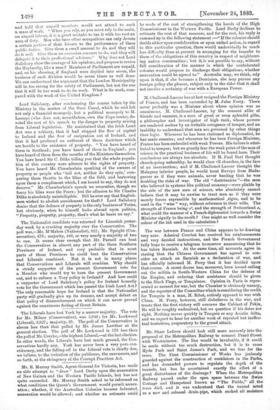The Tories are evidently going to resist the Municipal Bill
for London with their whole strength. The Lord Mayor, a typi- cal Tory, on Monday made to the Turners' Company the bold and foolish speech criticised elsewhere, in which he denounced any project for fusing London into a whole ; and on Thursday Lord Salisbury, at the City Carlton Club, said nearly the same thing. The Marquis declares that London is not a city, but an agglo- meration of towns, and that there "is scarcely any community of interest between the extreme East and West ends of the Metropolis,"—a very rash assertion, as he will see, if ever the "ugly rush" comes. He repudiated altogether the idea that a Municipality would be powerful in proportion to its bigness, and held that unpaid members would not attend to such a mass of work. "When you rely, as you must rely in the main, on unpaid labour, it is a great mistake to tax it with too vast an area of duty. Men who have other occupations can only devote a certain portion of their leisure to the performance of these public duties. Give them a small amount to do, and they will do it well. Give them an excessive amount to do, and they will delegate it to their professional advisers." Why does not Lord Salisbury show the courage of his opinions, and propose to revive the lieptarchy, like a man ? Members of Parliament are unpaid, and, on his showing, if England were divided into seven, the business of each division would be seven times as well done. We can understand the argument that the London Municipality will be too strong for the safety of Parliament, but not the one that it will be too weak to do its work. What is its work, com- pared with the work of the United Kingdom ?







































